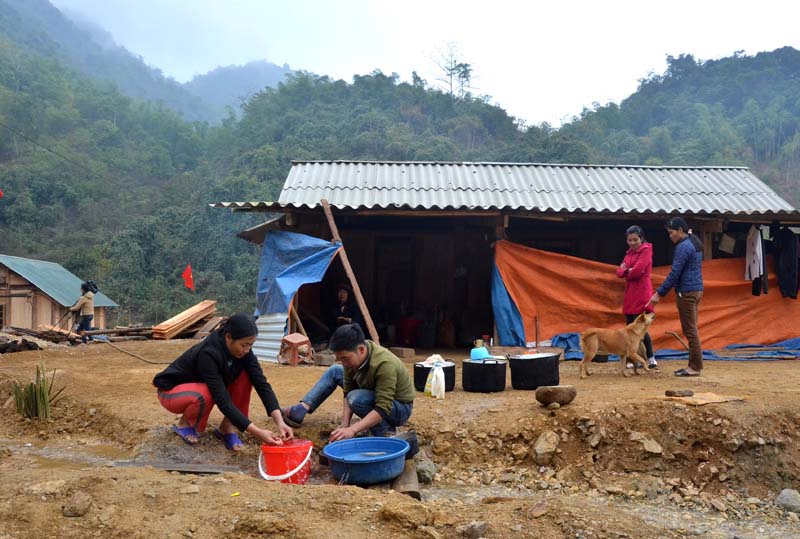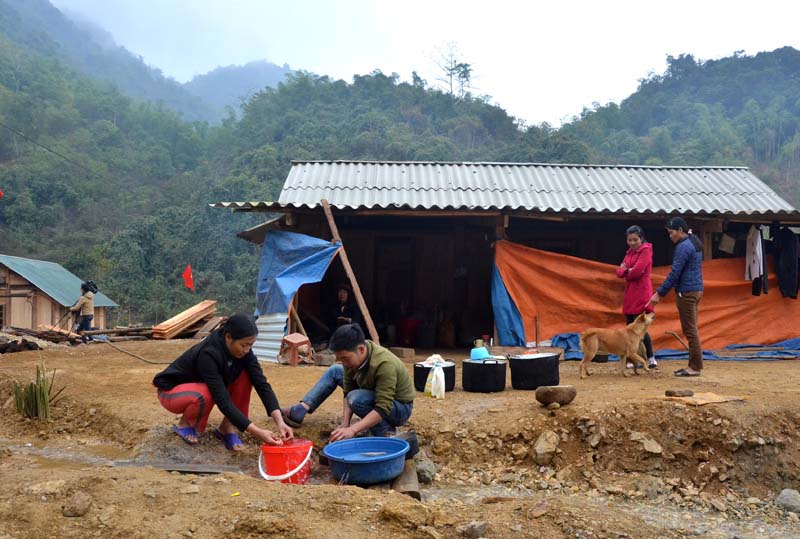


Out of the 710 households needing to have the stable accommodation, 492 households are located in the area of land and stone landslides; 218 households are located in areas with the risk of pipe flood and flash flood. Since 2018, the District’s People's Committee has developed a plan to arrange accommodation for these households, but due to the difficulty in resource constraints, the plans have not been implemented yet.
 The people in the
resettlement area of Nhap village, Dong Ruoi commune (Da Bac) have settled in a
new place.
The people in the
resettlement area of Nhap village, Dong Ruoi commune (Da Bac) have settled in a
new place.
Mr. Pham Minh Son, the Head of Agriculture and Rural Development Department of Da Bac district says: Through the review, the district has developed a plan to arrange the population stability for 710 households living in the high risk areas of natural disasters and unsafe in the rainy season. Specifically, it is necessary to arrange the interspersion for 241 households, the stable accommodation in place for 360 households, the new concentrated housing arrangements for 109 households by building 2 resettlement areas concentrated in Muong Tu commune (45 households) and Suoi Nanh commune (64 households). These are all households with an urgent need for safe accommodation to stabilize their long life. After building a specific plan, the district has proposed the Department of Agriculture and Rural Development to synthesize and advise the provincial People's Committee to allocate funds for the district to promptly implement the population allocation according to Prime Minister's Decision No. 1776 / QD-TTg. Prime Minister.
While there is no resources to implement the plan of the population allocation for the people in high risk areas of natural disasters, Da Bac district has focused on building 5 resettlement areas to stabilize new accommodation for 183 severely affected households who have been severely affected in the flash flood disaster and landslides in mid-week in October 2017. These are 5 urgent resettlement projects that are regularly directed, inspected and urged to speed up the progress by the Party Committee, People's Council and People's Committee of the province. By the end of May 2019, all 5 projects have completed the essential items with the total value of 95,839 billion VND of the implemented items. Along with completing the construction of the important infrastructure items such as leveling, the supply of power and domestic water, the construction of the drains for the rainy water and internal roads ... all the 183 households have moved to the resettlement areas and completed the houses, assuring to settle in a new place.
According to the People's Committee of Da Bac District: Although the construction of infrastructure and the support to move people to the new places have been completed as planned, the problem of the resources for all 5 projects is very difficult. According to the approval decision, the total investment of 5 resettlement areas is 120,883 billion VND, of which, the investment of the first phase is 102,728 billion VND to complete the essential infrastructure items and support the movement of the people. Until now, the value of the completed volume has reached about 95,836 billion VND, while the district has been granted only 53.2 billion VND (the provincial budget is 50 billion VND; the district budget is 3.2 billion VND). Thus, compared to the completed volume up to now, the allocated budget lacks 42,636 billion dongs; Compared to the total investment of the first phase with funding allocated so far, there is a shortage of 49,528 billion VND. Therefore, the People's Committee of Da Bac district have asked the People's Committee and the appropriate authorities of the province to consider providing the additional funding for the district to pay for the completed workload. After that, it is necessary to continue supporting the budget of 18,155 billion VND to invest the remaining items in the second phase, meeting the urgent and legitimate needs of the relocated migrants.
It is known that, over the past time, along with efforts to ensure the construction progress of 5 resettlement areas, Da Bac district has focused on implementing the support activities to help people stabilize their lives in new places. Immediately after supporting people to relocate in resettlement areas, 100% of the households, the district have urgently completed the construction of latrines for households with a capital of 6 million VND a household. They have allocated 100 million dongs from non-business capital of the National Target Program on building new rural areas in 2018 to support the communes to plant shade trees, creating the environmental landscapes in the resettlement areas with 20 million dongs a zone. At the same time they have mobilized the participation of the organizations and the unions, deploying the activities for the community to support people to improve their living environment and initially access to new sources of livelihood ...
In particular, with the determination to stabilize the life for the households in the new places in the context of the limited investment resources, the People's Committee of Da Bac district has instructed to strengthen the support activities and orient livelihoods for the people through the integration of appropriate programs, projects and economic models. Specifically, for the households in the resettlement areas near Hoa Binh hydropower reservoir such as Lau Bai village (Vay Nua commune), Nhap hamlet (Dong Ruoi commune), Tu hamlet (Tien Phong commune), the suitable livelihood orientation is to raise aquaculture. For households in Bo Coc village (Suoi Nanh commune), Ke hamlet (Muong Chieng commune) resettlement areas, the suitable livelihood orientations are the models of agroforestry, planting fruit trees combined with livestock and fish ponds. When they have accessed to the suitable sources of livelihood, people here will feel secure to produce and stabilize long-term life in the resettlement areas.